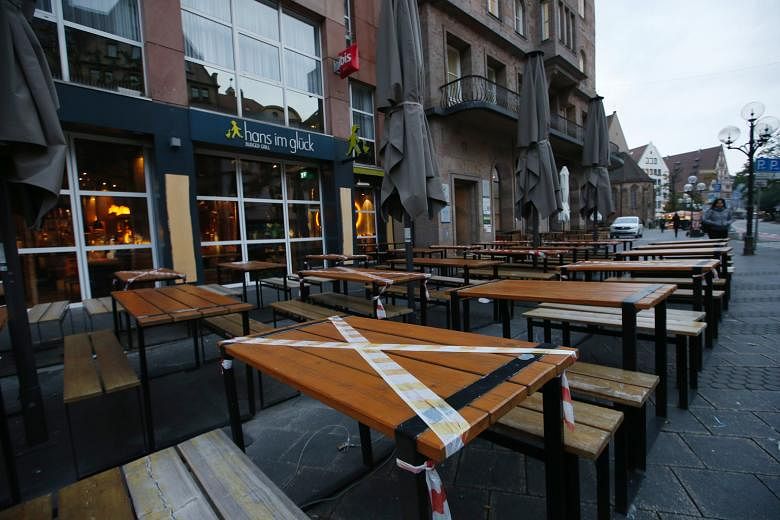BRUSSELS • Leaders in Europe have intensified efforts to slow coronavirus contagion rates, reviving lockdowns in some areas as piecemeal curbs have made little impact on a disease that has infected 4.9 million people.
New cases in Germany and Bulgaria hit a record high, and Hungary and Ukraine reported their highest daily Covid-19 death tolls yesterday.
Germany's new Covid-19 cases rose by 8,397 yesterday, the highest since the pandemic began. There were also 44 new fatalities yesterday, lifting the overall number of deaths to 9,842.
The spread caused the alpine district of Berchtesgadener Land near the Austrian border to impose sweeping restrictions on movement.
The popular tourism destination with about 106,000 people will close schools, shutter sports and leisure facilities, and confine people to their homes unless they have a "solid" reason to leave.
"If we stand up to the pandemic, we can come out of this stronger," said Mr Bernhard Kern, the district's administrator, adding that a further increase in infections "is to be feared".
Meanwhile, Bulgaria reported a record high of 1,024 new cases, the first time daily infections have gone past 1,000. The Bulgarian authorities have said they will consider introducing compulsory mask wearing outdoors. Until now, the government has ruled out introducing new nationwide restrictions.
Hungary reported a daily record of 38 coronavirus deaths yesterday, while the number of those being treated on ventilators has almost quadrupled this month.
Virologists advising the government have said Hungary risks losing track of infections with its low rate of testing.
Separately, Ukraine reported a record 113 deaths from Covid-19 yesterday over a 24-hour period.
Elsewhere in Europe, Ireland imposed some of the most severe restrictions in the bloc, with non-essential stores, bars and restaurants forced to close for at least six weeks.
"The evidence of a potentially grave situation arriving in the weeks ahead is too strong," Irish Prime Minister Micheal Martin said late on Monday in a televised address from Dublin. "Further action is now required."
Travel will also be further restricted, with people told to stay within 5km of their home.
Wales is following suit for two weeks.
People in Wales will be required to stay home from Friday until Nov 9, and all pubs, restaurants and non-essential retail outlets will be closed.
Prime Minister Boris Johnson has insisted that he does not want similar measures across the border in England. The British government is pushing leaders in Manchester, north-west England, to agree to tighter restrictions or face new rules being imposed against their will.
Meanwhile, the Italian region of Lombardy, which includes Milan, is due to impose a curfew from 11pm to 5am. Other regions are also considering such a move, according to Italian media reports.
In Belgium, all restaurants, bars and cafes in the country have been required to remain closed for four weeks since Monday.
A curfew from midnight to 5am is also in effect.
The Madrid authorities are studying whether to ask the Spanish government to impose a curfew for when the state of emergency currently enforced by order of the central government is lifted, according to Spanish media.
"It wouldn't be a decision to be applied only in Madrid," Mr Enrique Ruiz Escudero, the regional administration's senior health official, told newspaper El Pais.
"It wouldn't be bad for us, as long as we can determine opening times for economic activities."
In eastern Europe, the Czech government ordered people to wear face masks in public and inside cars if the passengers are not related.
Aside from national measures, the European Union plans to remove Canada, Tunisia and Georgia from its list of countries whose residents should be allowed to visit the bloc, according to EU officials familiar with the matter.
The United States will remain blacklisted along with most other countries in the world, according to the proposal, which was subject to approval by diplomats meeting in Brussels yesterday and today.
The EU intends at the same time to reopen its doors to travellers from Singapore as a result of improved virus trends in the country.
BLOOMBERG












